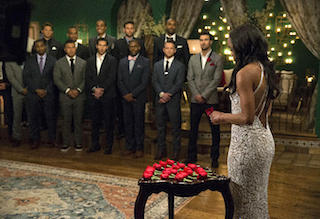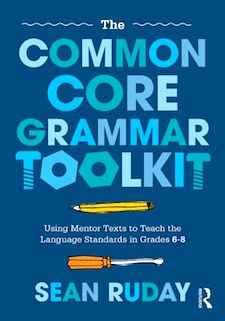The Grammar Bachelor: A Team Learning Activity
Picture a ceremony, like the ones made famous on ABC’s television series The Bachelor and The Bachelorette, in which a well-dressed man or woman selects from suitors vying for the opportunity to date him or her.
Reflecting on nebulous criteria such as Do we have a connection? and Is this person here for the right reasons? the Bachelor or Bachelorette chooses which suitors will continue on the show and, eventually, which one will be the “winner.”
Now, reconceptualize this ceremony so that it focuses on grammar and you’ll have one of my favorite activities to help middle and high school students understand the importance of grammatical concepts to effective writing!
Let me explain. . .
“The Grammar Bachelor/Bachelorette” is an activity in which students work together to argue for the importance of a particular grammatical concept.
To conduct this activity, I divide students into four “Suitor Groups,” each responsible for making the case for the importance of its assigned concept. For example, when recently conducting this activity with a high school English class, one group was tasked with making the case for relative clauses, another with advocating for prepositional phrases, a third with arguing for subordinating clauses, and a fourth with supporting participial phrases.

For example, a group focusing on subordinate clauses supported its explanation and discussion of the concept with an analysis of the impact of the subordinate clause “If ever you disturb the quiet of our streets again” in the Romeo and Juliet line “If ever you disturb our streets again, your lives shall pay the forfeit of the peace.”
Similarly, a group that presented on participial phrases supplemented its discussion of the concept’s features and importance by explaining the impact of the participial phrase “Flushed with his impassioned gibberish” in the sentence from The Great Gatsby, “Flushed with his impassioned gibberish he saw himself standing alone on the last barrier of civilization.”
Assessing performance
I evaluate each group’s performance based on three evaluation questions:
- Does the group clearly and thoroughly explain the features of its grammatical concept?
- Does it provide a thoughtful and detailed explanation of why the concept is important to effective writing?
- Does it share a published example of the concept and provide an analysis of why the concept is important to the text in which it appears?

Four things to remember
Here are some tips for conducting this activity with your students:
- Model the activity. Before students do this activity, show them what you’re looking for, starting with the explanation of a concept, moving to a discussion of its importance, and finishing with an analysis on the significance of the concept to a published text.
- Vary the groups. If you do the activity – or a variation on it – multiple times throughout the school year, mix up the groups so that students have different opportunities for collaboration with classmates.
- When deciding on the focal grammatical concepts, select grammatical concepts you’ve discussed with your students that represent the “cutting edge” of their understandings. While there will likely be some variation in your students’ understandings, the best concepts to use are those that aren’t too easy or too difficult for students to analyze.
- Encourage students to scour numerous examples of literature when looking for a published example to analyze. I recommend encouraging students to use your classroom library, the school library, any assigned books they’re reading, and any texts they’re reading independently.
An activity that’s worth the effort
I’ve done this activity with middle and high school classes with which I’ve worked, with future teachers in my classes on grammar and writing instruction, and with in-service teachers during professional development workshops I’ve conducted. It’s consistently a hit because it provides an engaging and relevant context for participants to work together and analyze the importance of specific grammatical concepts to effective writing.
When talking about grammar with students and teachers, I approach grammatical concepts as tools that authors use strategically and purposefully in their works to make their writing as strong as possible. Approaching grammar in this way facilitates positive discussions that help students build metacognition of the importance and utility of grammatical concepts and see grammar as more than just teachers correcting students’ mistakes.
_______________
Sean Ruday is an associate professor of English Education at Longwood University, a former classroom teacher, and the author of seven books published by Routledge Eye On Education. He is also a Co-President of NCTE’s Assembly for the Teaching of English Grammar. Sean frequently writes and presents on innovative ways to improve students’ literacy learning. You can find him on Twitter at @SeanRuday and email him at sean.ruday@gmail.com. His website is www.seanruday.weebly.com.
































This is great! The end of the last sentence is particularly poignant:
“…and see grammar as more than just teachers correcting students’ mistakes.”
I’d be curious to see how similar educational games could be formed based on other reality show formats (such as The Voice, Survivor, etc.).
A great idea! Learning grammar doesn’t have to be tedious and boring.